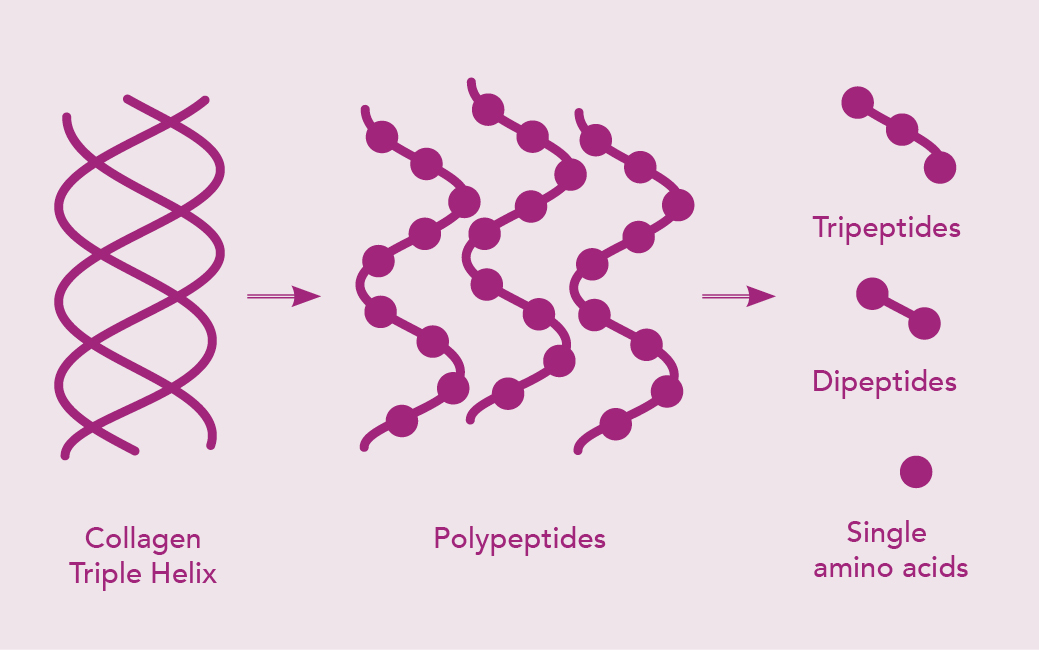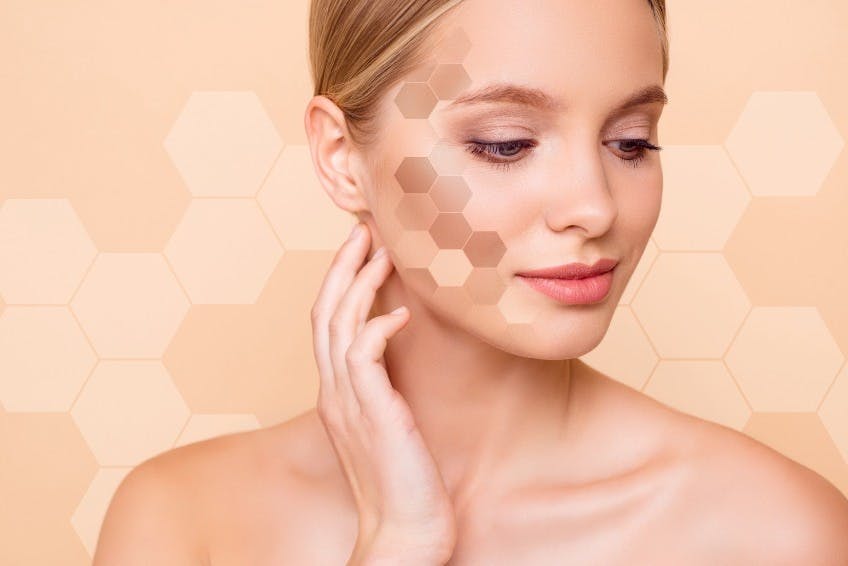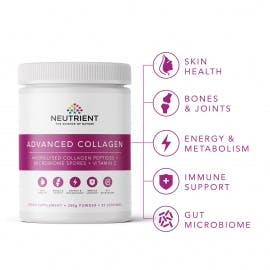Everything You Need To Know About Hydrolysed Collagen Peptides
Where is collagen found in the body?
Collagen is one of the most abundant proteins found in the body and accounts for up to 30% of your body’s total protein content. Looking after your collagen is an important part of your daily wellbeing since collagen levels naturally start to decline from the age of 30 onwards. Hydrolysed collagen peptides and vitamin C help to replenish collagen reserves.
One of the main attributes of collagen is its ability to provide strength, flexibility and elasticity to a diverse range of body tissues. Collagen is used to build connective tissue, a glue-like substance that supports and holds the body together1.
Different types of collagen fibres are used to build different body tissues. These collagen fibres create the strong frameworks that underpin the foundations or your skin, bones, cartilage, organs, muscles, tendons, ligaments, blood vessels, teeth, hair and nails2.
Different types of collagen
Researchers have identified 28 different types of collagen and each type is identified by its own unique amino acid sequence. Types I to IV collagen are the most important and provide unique functions to different areas of the body.
• Type I – bones, skin, tendons, ligaments, connective tissue, blood vessels, organs, eyes, hair, nails
• Type II – cartilage, eyes
• Type III – found alongside Type I
• Type IV – part of all cell membranes
• Type V – hair, skin and on cell surfaces
Bovine sourced collagen
Since over 90% of the collagen found in your body is Type I3, it makes sense to supplement with bovine collagen, one of the richest forms of Type I collagen. It’s important to choose bovine collagen sourced from grass-fed, pasture-raised herds for issues of sustainability and purity.
Fast-acting hydrolysed collagen peptides
Collagen is an incredibly large and complex molecule, made up of three long chains of amino acids, coiled into triple helix strands. Collagen molecules in food are far too big to be absorbed and need to be broken down during digestion which unravels the triple helix, separates long polypeptide chains and splits off sections that are three (tripeptide), two (dipeptide) or single amino acids ready to be absorbed.

With hydrolysed collagen peptides, all the hard work has been done for you, as the collagen molecules have been broken down into collagen peptides which can be rapidly absorbed into the bloodstream and delivered to areas of the body where they are needed most.
Nourish skin from within
Naturally glowing skin is achieved by locking in moisture, neutralising factors that damage skin cells and nourishing skin cells with vitamins and collagen peptides to help replenish collagen reserves4. Collagen plays its role in skin health by forming a network filled with hyaluronic acid and elastin fibres that help lock in water, plump up the skin and keep skin soft and flexible5. As collagen levels decline, your skin tone starts to sag, giving rise to the visible signs of ageing, AKA wrinkles6.7.
Special skin cells called fibroblasts constantly replenish your skin’s collagen levels and studies show that hydrolysed collagen peptides may increase the number and activity of fibroblasts, good news for collagen renewal8-15. Collagen is formed from 18 different amino acids, but there’s one amnio acid, hydroxyproline that’s the most effective for skin hydration, elasticity and smoothing fine lines 3,5 and bovine collagen is the richest source of hydroxyproline16.
Putting the C into Collagen
Studies have established that vitamin C helps activate two enzymes involved in collagen formation. Without vitamin C these enzymes may struggle to work efficiently, slowing the production of collagen down17,18,19.
Skin cells are under constant threat from external and internal sources of free radicals (sugar, smoking, UV rays) which have the potential to harm your skin cells20,21,22. Free radicals increase oxidative stress which damages collagen. You can support your skin with the help of vitamin C which protects cells from oxidative stress.
Menopause link
Changing hormones reduce the body’s ability to naturally replenish collagen within the skin23. A staggering 30% of collagen is lost from the skin within the first five years after the menopause24. Finding ways to support skin tone is an essential beauty step for more mature skin, queue hydrolysed collagen peptides! One study showed improvements in skin elasticity, reduced total pores and a reduction in fine lines for women aged 40 to 60 when taking hydrolysed collagen peptides and vitamin C25,26.
Keeping supple
Replenishing your collagen reserves is important if you are conscious of looking after your joint health27,28. Collagen contributes to the spongy matrix which enables cartilage to support your joints as you move29. Sports injuries or simply a lifetime of wear-and-tear could take its toll on the cartilage found in your knees, hips, wrists, shoulders and spine causing pain and inflammation that may limit your range of movement and prevent you from doing the things you love as you grow older.
One 12-week study involving young physically active individuals took 5g hydrolysed collagen peptides a day. In contrast to the placebo group, those taking collagen experienced a considerable reduction in activity-related knee joint pain and showed a reduced need for ice packs and physiotherapy30.
Tone up
High protein diets are well-known for helping build muscle16, especially when paired with an appropriate training programme31. Hydrolysed collagen peptides are becoming popular with athletes and fitness enthusiasts because they provide a source of pure protein and amino acids. Adding just 10g to a workout smoothie provides a healthy, dairy-free alternative to whey-based sports formulas for those with sensitive digestion.
Body conditioning
Thinning bones and loss of muscle strength, mass and tone are commonly associated with sedentary lifestyles, the menopause and growing older. A recent 12-week clinical trial demonstrated that participants taking a collagen peptide supplement in combination with resistance training were able to improve their body composition by increasing muscle strength and bone mass as well as reducing body fat32.
Hungry appetite
Many weight-loss strategies have their challenges, namely hunger, cravings and portion control. Research shows that a diet rich in high-quality protein, whether from food or a protein powder, may help reduce ghrelin (a hunger hormone) and increase peptide YY (a feel full hormone) helping curb appetite and support portion control33. Hydrolysed collagen peptide powders provide valuable proteins without added calories from fats or carbs making them a perfect support supplement when embarking on a new diet.
Feel fuller for longer
Finding effective ways to dampen down hunger signals and cravings is essential when stress, boredom and emotional eating could sabotage your progress. Hydrolysed collagen peptides provide a rapidly absorbed source of nourishment to help you feel full and satisfied in-between meals. In fact, studies show that protein drinks significantly reduce food intake at the next meal34.
So how much protein is enough?
Taking your protein up to 20-30% of daily calories is what’s required to help turn up the feel full factor, reduce food intake at meals, support weight loss and minimise rebound weight gain35.
An afternoon drink with 2 tablespoons (10g) of hydrolysed collagen peptides to tea, coffee or smoothie is an easy way to top up on protein, distract you from 3pm cravings and build motivation and success.
Getting more collagen into your diet
To truly benefit from the replenishing and nourishing effects of hydrolysed collagen peptides you need to aim for a daily serving of 10g, which is approximately two tablespoons of Advanced Collagen. Thankfully this product is incredibly easy to use, mainly due to the fact that it easily dissolves in any hot or cold drink – think smoothies, coffee, soups and if you are in a more culinary creative mood then you can add this versatile protein powder to breakfast cereals, porridge and even pancake mix!
Keep hydrated and nourish your skin
If you don’t have time (or the inclination) to get creative with your hydrolysed collagen peptides, then don’t worry. Simply put your daily serving into your water bottle, shake to dissolve (which will take seconds), add a squeeze of lemon or lime (completely optional) and just sip throughout the day. No sweat, no stress - just a super-fast and easy way to nourish your skin.
For recipe ideas and culinary inspiration – view our 15 DELICIOUS ADVANCED COLLAGEN RECIPES.
References
- Aigner T, Gelse K & Poschl E. Collagens—structure, function, and biosynthesis. Advanced Drug Delivery Reviews 2003; 55: 1531 – 1546.
- Bertaud A, Godeau G and Senni K. Magnesium and connective tissue. Magnesium Research 2003; 16, 1: 70-74.
- Lodish H, Berk A, Zipursky SL, et al. Molecular Cell Biology. 4th edition. New York: W. H. Freeman; 2000. Section 22.3, Collagen: The Fibrous Proteins of the Matrix. Available from: https://www.ncbi.nlm.nih.gov/books/NBK21582/
- Patrícia Maia Campos et al. An Oral Supplementation Based on Hydrolyzed Collagen and Vitamins Improves Skin Elasticity and Dermis Echogenicity: A Clinical Placebo-Controlled Study. Clin Pharmacol Biopharm. 2015; 4,3: 1-6. DOI: 10.4172/2167-065X.1000142
- Asserin J et al. The effect of oral collagen peptide supplementation on skin moisture and the dermal collagen network: evidence from an ex vivo model and randomized placebo-controlled clinical trial.Journal of Cosmetic Dermatology 2015; 14, Issue 4 p. 291-301. https://doi.org/10.1111/jocd.12174
- Kohl E, Steinbauer J, Landthaler M et al. Skin ageing. J Eur Acad Dermatol Venereol 2011; 25: 873– 84.
- Batisse D, Bazin R, Baldeweck T et al. Influence of age on the wrinkling capacities of skin. Skin Res Technol 2002; 8: 148– 54.
- Zague V, de Freitas V, da Costa Rosa M et al. Collagen hydrolysate intake increases skin collagen expression and suppresses matrix metalloproteinase 2 activity. J Med Food 2011; 14: 618– 24.
- Matsuda N, Koyama Y, Hosaka Y et al. Effects of ingestion of collagen peptide on collagen fibrils and glycosaminoglycans in the dermis. J Nutr Sci Vitaminol (Tokyo) 2006; 52: 211– 5.
- Shigemura Y, Iwai K, Morimatsu F et al. Effect of prolyl‐hydroxyproline (pro‐hyp), a food‐derived collagen peptide in human blood, on growth of fibroblasts from mouse skin. J Agric Food Chem 2009; 57: 444– 9.
- Albini A, Adelmann‐Grill BC. Collagenolytic cleavage products of collagen type i as chemoattractants for human dermal fibroblasts. Eur J Cell Biol 1985; 36: 104– 7.
- Postlethwaite AE, Seyer JM, Kang AH. Chemotactic attraction of human fibroblasts to type i, ii, and iii collagens and collagen‐derived peptides. Proc Natl Acad Sci U S A 1978; 75: 871– 5.
- Proksch E, Schunck M, Zague V et al. Oral intake of specific bioactive collagen peptides reduces skin wrinkles and increases dermal matrix synthesis. Skin Pharmacol Physiol 2014; 27: 113– 9.
- Proksch E, Segger D, Degwert J et al. Oral supplementation of specific collagen peptides has beneficial effects on human skin physiology: a double‐blind, placebo‐controlled study. Skin Pharmacol Physiol 2014; 27: 47– 55.
- Ohara H, Ito K, Iida H et al. Improvement in the moisture content of the stratum corneum following 4 weeks of collagen hydrolysate ingestion. Food Sci Technol Res 2009; 56: 137– 45.
- Inoue N, Sugihara F, Wang X. Ingestion of bioactive collagen hydrolysates enhance facial skin moisture and elasticity and reduce facial ageing signs in a randomised double-blind placebo-controlled clinical study. J Sci Food Agric. 2016;96(12):4077-81.
- Telang PS. Vitamin C in dermatology, Indian Dermatol Online J 2012; 4:143-6.
- Princeton consumer research ltd (2014).a double-blind, home-use study in approximately 45 healthy volunteers with ageing, non-firm skin to assess the efficacy of different treatment dosages of a vitamin c dietary supplement compared to a placebo control group.
- Pullar JM, Carr AC, Vissers MCM. The Roles of Vitamin C in Skin Health. Nutrients. 2017;9(8):866.
- Knuutinen A, Kokkonen N, Risteli J, Vähäkangas K, Kallioinen M, Salo T, Sorsa T, Oikarinen A. Smoking affects collagen synthesis and extracellular matrix turnover in human skin. Br J Dermatol. 2002 Apr;146(4):588-94. doi: 10.1046/j.1365- 2133.2002.04694.x. PMID: 11966688.
- Danby FW. Nutrition and aging skin: sugar and glycation. Clin Dermatol. 2010 Jul-Aug;28(4):409-11. doi: 10.1016/j.clindermatol.2010.03.018. PMID: 20620757.
- Bosch R, Philips N, Suárez-Pérez JA, et al. Mechanisms of Photoaging and Cutaneous Photocarcinogenesis, and Photoprotective Strategies with Phytochemicals. Antioxidants (Basel). 2015;4(2):248-268. Published 2015 Mar 26. doi:10.3390/antiox4020248
- Calleja-Agius J & Brincat M(2012) The effect of menopause on the skin and other connective tissues, Gynecological Endocrinology, 28:4, 273-277, DOI: 10.3109/09513590.2011.613970.
- Brincat MP et al. Skin Aging and Menopause. Implications for Treatment. Am J Clin Dermatol 2003; 4 (6): 371-378.
- Patrícia Maia Campos et al. An Oral Supplementation Based on Hydrolyzed Collagen and Vitamins Improves Skin Elasticity and Dermis Echogenicity: A Clinical Placebo-Controlled Study. Clin Pharmacol Biopharm. 2015; 4,3: 1-6. DOI: 10.4172/2167-065X.1000142
- Patrícia Maia Campos et al. An Oral Supplementation Based on Hydrolyzed Collagen and Vitamins Improves Skin Elasticity and Dermis Echogenicity: A Clinical Placebo-Controlled Study. Clin Pharmacol Biopharm. 2015; 4,3: 1-6. DOI: 10.4172/2167-065X.1000142
- Praet et al. (2019) Oral Supplementation of Specific Collagen Peptides Combined with Calf-Strengthening Exercises Enhances Function and Reduces Pain in Achilles Tendinopathy Patients. Nutrients 11(1), 76;
- Dressler et al. (2018) Improvement of Functional Ankle Properties Following Supplementation with Specific Collagen Peptides in Athletes with Chronic Ankle Instability. J Sports Sci Med 17(2):298-304.
- Donald J Responte, Roman M Natoli, Kyriacos A Athanasiou. Collagens of Articular Cartilage: Structure, Function, and Importance in Tissue. EngineeringCritical Reviews in Biomedical Engineering February 2007 35(5):363- 411
- Denise Zdzieblik, Steffen Oesser, Albert Gollhofer, and Daniel König. Improvement of activity-related knee joint discomfort following supplementation of specific collagen peptides. Applied Physiology, Nutrition, and Metabolism 2016; 42(6): 588-595. https://doi.org/10.1139/apnm-2016-0390
- Campbell, B., Kreider, R.B., Ziegenfuss, T. et al. International Society of Sports Nutrition position stand: protein and exercise. J Int Soc Sports Nutr 4, 8 (2007). https://doi.org/10.1186/1550-2783-4-8
- Baumstark M et al. Collagen peptide supplementation in combination with resistance training improves body composition and increases muscle strength in elderly sarcopenic men: A randomised controlled trial. British Journal of Nutrition 2015; 114, 8: 1237-1245. Doi:10.1017/S0007114515002810
- Heather J. Leidy Cheryl L.H. Armstrong Minghua Tang Richard D. Mattes Wayne W. Campbell. The Influence of Higher Protein Intake and Greater Eating Frequency on Appetite Control in Overweight and Obese Men. Obesity 2012; 18,9: 1725-1732. https://doi.org/10.1038/oby.2010.45
- M.S. Westerterp-Plantenga,1,2 A. Nieuwenhuizen,1,2 D. Tome,´ 3 S. Soenen,1,2 and K.R. Westerterp1,2 Dietary Protein, Weight Loss, and Weight Maintenance . Annu. Rev. Nutr. 2009. 29:21–41.
- Heather J Leidy, Laura C Ortinau, Steve M Douglas, Heather A Hoertel, Beneficial effects of a higher-protein breakfast on the appetitive, hormonal, and neural signals controlling energy intake regulation in overweight/ obese, “breakfast-skipping,” late-adolescent girls. The American Journal of Clinical Nutrition, Volume 97, Issue 4, April 2013, Pages 677–688, https://doi. org/10.3945/ajcn.112.053116.


.jpg?auto=format&q=45&w=262&trim=auto)
.jpg?auto=format&q=45&w=262&trim=auto)
.jpg?auto=format&q=45&w=262&trim=auto)